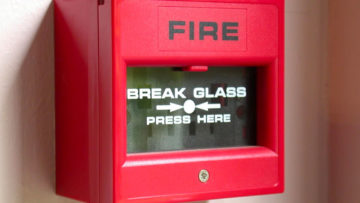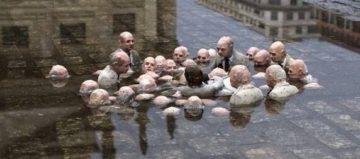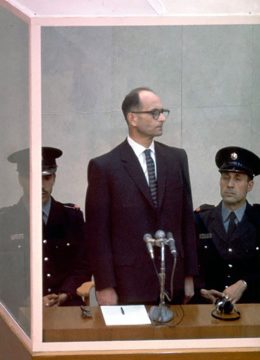by Chris Horner

The alarm bells are deafening, and the evidence is irrefutable: greenhouse gas emissions from fossil fuel burning and deforestation are choking our planet and putting billions of people at immediate risk.…[…] We are sleepwalking to climate catastrophe. […] It is a a “code red for humanity. —António Guterres, United Nations Secretary General.
The world is moving ever closer to catastrophic climate crisis and yet the economies of the world are still going for growth, while the major fossil fuel extractors row back on their pledges to switch to renewables instead of dragging out yet more oil and gas. Automobiles are everywhere; planes fly across the globe to all destinations. And the weather gets more and more extreme: flood, fire, hurricane and drought. And still we continue down the mad path to an unliveable planet.
A catastrophe is developing, not in the future, nor in some distant scenario but right now. And it is clear that far too little, too late, is being done in response. What is less obvious is why this should be so. The reasons for the slowness and inadequacy of the measures taken can, of course, be identified as lying in the kind of political log jams that characterise the present time, along with bureaucratic inertia, weak leadership and the influence of special interest groups in delaying and obfuscating. Yet if we really are on the edge of an abyss, as Guitterez says, one might expect more to be happening.
If nothing less than war time measures need to be taken, why are we not taking them?
Of course, unlike 1939 or 1941, we face a kind of crisis that can’t be easily pinned down to one clear event, like the invasion of Poland or the bombing of Pearl Harbor. It’s more a slow motion catastrophe that is now beginning to accelerate. Perhaps a major disaster that grasps our legislators’ attention and spurs them to action will happen, like a huge pulse of water and massive inundations following the collapse of the Antarctic ice sheet. But by then, it may be too late anyway. One hopes not.

One of the problems that we confront is the sheet scale and novelty of the threat. So we reach for examples from the past to serve as models for action today. But the problem with that, as Hannah Arendt pointed out decades ago, is that new problems require the kind of fresh creative thought that does not apply a rule or solution to the present by dredging up one from the past. Yesterday’s solutions won’t solve today’s problems. Yet the past can be a kind of guide, if we know how to draw on it properly. For this we must emulate rather than imitate. We cannot repeat the answers of the past, because we are faced with new and unprecedented questions. What we should do, however, is remind ourselves what the best and worst kinds of response to a major crisis are. Then we will need to apply our judgment: we will need to think what we are doing, and what we must do. Then we must act, and act quickly.
Arguably the person who spent the most time and effort on the question of thinking what we are doing, and the way that relates to judgment and action in the public sphere was Hannah Arendt. Can we learn anything from what she has to say about such matters that can help us find a way forward, with imagining that we can just apply ready made solutions to today’s situation? I think we can.
Arendt, of course, is most often associated in the public mind with the ‘banality of evil’ thesis, a controversial claim about the nature of the Nazi perpetrators of the ‘final solution’, in particular Adolf Eichmann. It is not to that debate I wish to turn here, but rather to an aspect of it which can help us get a grasp on the paralysis of thought and action we see today. That aspect is the question of thinking itself, or rather the lack of it. This might seem an odd thing to stress: after all, aren’t our institutions of governance, administration and media filled with intelligent people? No doubt, but that isn’t the kind of thought Arendt is concerned with here. We don’t lack intelligent minds. What we do miss is the kind of thinking she is concerned with, which is the first step in a chain that takes us though judgment to public action aimed at preserving our shared world.

To stay with the example of Eichmann for a moment: he had been a key figure in the organisation of the holocaust. Captured and brought to trial in Jerusalem in 1960, Arendt’s interest in him stemmed partly from the kind of man he showed himself to be. In him she saw a man who far from being some monster of depravity and insane fanaticism was rather a functionary. Literally: a man who had become a function of the Nazi state. For Arendt, Eichmann’s culpability lay in the way he had allowed himself to commit such acts, while seeing himself as an ordinary man doing his duty as an official of the state. Arendt found this ‘ordinary’ quality more disturbing than the ‘Nazi monster’ one might have expected. And she noted his failure to think about what he was doing. He was a thoughtless man.
This does not mean he was stupid. He performed quite skilled tasks, oversaw numerous other bureaucrats and functionaries, and acted with a good deal of resource and effort when it came to ensuring the successful liquidation of Jews in obedience to the Fuhrer’s will. What Arendt found lacking in Eichmann takes us to the heart of what she meant by thinking and judging. In addition, it takes us to a central problem of today. For the ‘banality of evil’ resonates beyond the Israeli courtroom in 1961 or the Nazi regime of 1933-45. The kind of thoughtlessness Arendt found in Eichmann is present, now. It’s possible to question whether her assessment of him was entirely correct – I think it was, but that isn’t the issue here. Eichmann’s story is paradigmatic, significant not only as a reminder of past horror but a warning about the present and the future. Whatever we make of him, she had surely identified an important facet of our contemporary malaise: a kind of thoughtlessness. But what kind? What was he failing to think about?
Arendt identifies two kinds of thinking. The first is ‘means – ends rationality’. In order to achieve goal x we must adopt means y. This is the kind of practical intelligence of the human understanding that Eichmann excelled in. It is the metier of the administrator, the technician and the manager – and the GPS in your car. The other kind is harder to pin down. It is the willingness to engage in a silent dialogue with the self, a resultless, perpetual capacity to think about the meaning of what one is doing or proposing. This involves taking responsibility for what one does. It is the absolute precondition for moral autonomy, and for being a citizen: so it has a political meaning, one that for Arendt is even more important than the moral one.

Here we see the refusal to think as a mark of the ‘banality of evil’, a failing that is quite different from mere stupidity. Eichmann is failing to meet the absolute precondition for the moral life, which is to think for oneself. He is ‘just following orders’. The events of the twentieth century – totalitarianism, racism, world war, genocide – mark, for Arendt, a unique crisis in the morality of the west. To that we can now add climate catastrophe. This is a crisis with a blank in the middle of it – no thought, the absence of meaning. Arendt connects this thoughtlessness to the atrophy of the faculty of judgment. Indeed, for her, all the old categories, ways and modes of the past are in question and must be re-examined. This includes our conception of what it is to labour, to make, and to act as well as think and judge. The trail may begin with a bespectacled bureaucrat in the dock of a 1961 court but does not end there. For Arendt the question of why Eichmann did not think or judge is important because of the train of thought it sets in motion: perhaps the blankness in Eichmann stands for a void in the wider culture of modernity, and a key to the disavowal of the obvious – that the very biosphere we rely on is being destroyed, and us with it if we do nothing.
Since the information about climate change is here to see for those with eyes to see and ears to hear, why is thinking important? Surely it is action that is wanting. And this is true. But the kind of thought I’m considering here is the sort that is absolutely essential if genuine action – meaningful, mindful action and not just rote behaviour or adherence to precedent is to occur. To think what we are doing in Arendt’s sense of it is to engage in the first step to a kind of political existentialism: to actually grasp not only the enormity of what is unfolding around one, but to take the kind of personal responsibility to act beyond the ken of the man in the court in 1961. It is to break out of the rule-following mind set, to actually grasp what is happening and to begin to engage with others on what must be done.
Arendt’s concern here is more political than moral. Closely associated with the abdication of responsibility that she identifies is the loss of public space, the context in which ‘we, the people’ actually play a role in in protecting and preserving the world we inhabit, and effect real change. Without that, all we have is administration, not politics; governance rather than democracy. The retreat into private life is a kind of privation – and she remarks on the irony that a consumer oriented culture in the USA would identify the country’s success with GDP rather than what Jefferson called the ‘public happiness’ of concerted action that is self rule.
The problem is that our consumerist market society encourages a turn away from public life. The interaction with others that happens at work and in consumption is seen in terms of private individuals. So the individual – the subject – thinks of herself as primarily a private being, and only secondarily, if at all, as a public one. But this is deeply damaging. It amputates an important aspect of what we are – what Aristotle dubbed the Zoon politikon , the political animal, the language user with a role in forming the shared life. The view that is dominant however, is that the private interests of individuals override concern for the public world, so individuals act publicly only when it comes to protecting their private interests, like acting with others to ensure a prison or a sewage disposal plant isn’t built in their neighbourhood. This is a view encouraged by many economists, who see the subject as a rational chooser, pursuing whatever ends will benefit him or herself. The emphasis on the primacy of the private tends to eliminate politics, or to reduce it to the spectator sport of, every few years, choosing one celebrity politician over another and then forgetting about it most of the time.
This approach will not only destroy the res publica, the public thing, but the private goods we hold dear too, since climate change will eliminate both. The effect of evacuating public political action to professional politicians and bureaucrats is to render genuinely political action nugatory. If the citizen becomes more and more like a consumer, then politicians becomes more like salesmen and women, offering differently packaged but ultimately similar policies designed to respond to private interests (eg tax cuts). And any action to combat the real threats we face become hobbled by the pressure of special interest groups to avoid threatening profits, presented to voters as cost-free solutions to a environmental crisis that really needs national mobilisation akin to a war. Such feeble moves are almost worse than nothing at all, since they do just enough to reassure that something is being done, while doing little. They promote a dangerous climate of apathy and cynicism.
There are, of course, too many indications that something disastrous is happening to be ignored completely. Thanks partly to activists who have been ringing the fire bell for sometime, the build up of credible scientific evidence and more, there is now a sense of real unease among the general public, and those who accept the reality of human induced climate change far outnumber the minority of denialists. But we need more than unease, and far more than palliatives from our leaders. Many seem in the grip, not of outright denial, but of a kind of fetishistic disavowal, along the lines of ‘I know this very well…but nevertheless …’ What is going on is pushed to the side and treated as practically irrelevant to what one does. This happens at the level of the individual, (plane trips, skiing holidays, car use) but more crucially, huge corporations and public bodies act in the same way. Verbal service is done to the climate catastrophe while business as usual goes continues.
Arendt held that thinking is the indispensable precursor to effective judgment and action. Drawing on the thought of Immanuel Kant, she also argued that a kind of judgment is also crucial.
 For Kant, judgment has two aspects: determinant and reflective. In determinant judgment one has a rule, a concept or category that one applies to a particular instance. To give a simple example: I have the concept of a saucer (round, made of china, has a circular indent for a cup, etc.); I encounter a particular thing that ‘falls under’ my concept of a saucer and I make the judgment: this thing here is a saucer. Two things about this kind of judgment are worth remarking on immediately. One is the coercive nature of the judgment. If the particular fits the concept, then it is a saucer – a correct judgment must be that this is a saucer, and all competent judges will have to agree it is a saucer, not an umbrella or a computer. There is something automatic in our experience of this aspect of judgment, as if one were immediately following orders. The understanding legislates – it gives the rule for correct judgment of a particular. Think of determinant judgment as a kind of logical judgment – a ‘downward’ move as it were, from the concept to the particular: ‘the concept saucer applies to this x’. We do this every day. And it is what the judge does in a courtroom and what the administrator does when she applies a regulation to a particular case.
For Kant, judgment has two aspects: determinant and reflective. In determinant judgment one has a rule, a concept or category that one applies to a particular instance. To give a simple example: I have the concept of a saucer (round, made of china, has a circular indent for a cup, etc.); I encounter a particular thing that ‘falls under’ my concept of a saucer and I make the judgment: this thing here is a saucer. Two things about this kind of judgment are worth remarking on immediately. One is the coercive nature of the judgment. If the particular fits the concept, then it is a saucer – a correct judgment must be that this is a saucer, and all competent judges will have to agree it is a saucer, not an umbrella or a computer. There is something automatic in our experience of this aspect of judgment, as if one were immediately following orders. The understanding legislates – it gives the rule for correct judgment of a particular. Think of determinant judgment as a kind of logical judgment – a ‘downward’ move as it were, from the concept to the particular: ‘the concept saucer applies to this x’. We do this every day. And it is what the judge does in a courtroom and what the administrator does when she applies a regulation to a particular case.
The other type of judgment is reflective. Here we make a judgment for which there is no pre-existing rule or concept. We confront a particular for which there is no rule, no pre-existing classifying concept. The judge (who might be you, me, or President Biden) must fall back, not on a classifying concept, but on their own experience in the here and now. Old rules and ways of doing things can’t simply be invoked here: the imagination must be creatively engaged. It is fundamentally political since it is pictured as happening between the spectator, the citizen or the political actor: Arendt, drawing on Kant’s notion of an aesthetic judgement, argues that reflective judgments are essentially intersubjective: they assume the presence of others, who share a kind of common sense. Judgment must be communicable: it is a public faculty. Because the judgment is reflective, it is not determined by a concept; because it is exercised as a public faculty it escapes the arbitrary nature of the merely subjective. This conception of judgment as essentially visible, a way of disclosing who we are when we judge, places it at the heart of her conception of action in politics. Just as thinking and imagination make reflective judgment possible, so this account of judgment shows the true nature of what is political.
 To be involved in the political is to be an active citizen, visible to others, a unique one among many, judging and acting together to preserve and protect the res publica, and the shared, fragile world. This transcends even the moral and religious beliefs of the participants: to be a mature individual means to take responsibility for the shared world, to show, in her phrase, Amor Mundi, love of the world that we inherit from the dead generations and must pass on to the yet unborn. We do not all agree on what to do, of course: dissensus characterises it, not consensus. But this is what it means to be in a republic, in a democratic contestation over ends. We must act together to meet the challenge of the hour, and must press our politicians to do no less. It must be the shared public project of the citizens, not the private consumers. And the time to act is now, for the alarm bell is ringing.
To be involved in the political is to be an active citizen, visible to others, a unique one among many, judging and acting together to preserve and protect the res publica, and the shared, fragile world. This transcends even the moral and religious beliefs of the participants: to be a mature individual means to take responsibility for the shared world, to show, in her phrase, Amor Mundi, love of the world that we inherit from the dead generations and must pass on to the yet unborn. We do not all agree on what to do, of course: dissensus characterises it, not consensus. But this is what it means to be in a republic, in a democratic contestation over ends. We must act together to meet the challenge of the hour, and must press our politicians to do no less. It must be the shared public project of the citizens, not the private consumers. And the time to act is now, for the alarm bell is ringing.
